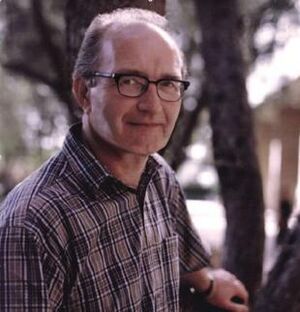Denis Cosgrove facts for kids
Quick facts for kids
Denis Cosgrove
|
|
|---|---|
 |
|
| Born |
Denis Edmund Cosgrove
3 May 1948 Liverpool, England
|
| Died | 21 March 2008 (aged 59) |
| Nationality | British |
| Alma mater |
|
|
Notable work
|
|
| Spouse(s) |
|
| Children | 3 |
| Awards |
|
| Scientific career | |
| Institutions |
|
| Thesis | Palladian Landscape: Geographical change and its cultural representations in 16th century Italy (1976) |
| Doctoral students | Professor Veronica Della Dora FBA |
Denis Edmund Cosgrove (born May 3, 1948 – died March 21, 2008) was a British expert in cultural geography. He taught at several universities, including Oxford Polytechnic, Loughborough University, Royal Holloway, University of London, and the University of California, Los Angeles (UCLA). In 1998, he received a special award called the Back Award from the Royal Geographical Society for his important work.
Contents
Who Was Denis Cosgrove?
Denis Cosgrove grew up in Liverpool, England, as one of six children. His father, a bank manager, was very involved in his education. Denis went to a Jesuit school, St Francis Xavier's College, Liverpool, just like his father.
He loved geography, but his school didn't think it was an important subject. As a top student, he was told to study Latin and Greek instead. When his mother complained, the headmaster said, "geography is a girl's subject." This shows how ideas about subjects have changed over time!
How Did He Study Geography?
Despite this, Denis won a scholarship to study geography at St Catherine's College, Oxford. He finished his first degree in 1969. Then, he went to the University of Toronto in Canada to get another degree in geography.
After getting married in New York, he returned to the University of Oxford for his doctorate degree. This is a very high-level degree. He started working as a lecturer at Oxford Polytechnic in 1972. His important research on the landscape of Venice was first submitted for a different degree. But his examiner, David Lowenthal, thought it was so good that he insisted it be used for a Doctor of Philosophy (DPhil) degree, which Denis received in 1976.
Denis married Isobel Thubron in 1970, and they had two daughters before they divorced. Later, in 1989, he married Carmen Mills, and they had a son.
Where Did He Teach?
Denis stayed at Oxford Polytechnic until 1980, becoming a Principal Lecturer. He then moved to Loughborough University and later to Royal Holloway, University of London in 1994, where he became a Professor. He even became the Dean of the Graduate School there.
In 2000, Denis became a professor at the University of California, Los Angeles (UCLA) in the United States. He continued to be a Visiting Professor at Royal Holloway, University of London until he passed away.
Denis was about to become the head of the Geography department at UCLA. Sadly, he became ill in 2006 and passed away on March 21, 2008, at his home in West Hollywood, California. He was 59 years old.
What Did Denis Cosgrove Research?
Denis Cosgrove's research was all about understanding the meanings of landscape. He studied how people see and use the world around them. He was especially interested in how visual things, like maps and art, have shaped our ideas about geography throughout history.
He looked at how geography, as a school subject, connects with how we show geographical knowledge in art. This work was very important for a new field called the geography of media and communication.
Exploring Landscapes and Cultures
Denis studied many different things, including:
- How landscapes changed in 16th-century Venice and northern Italy.
- Writings about landscapes by authors like John Ruskin.
- How space and performance were used in 20th-century Rome.
- The history of how people imagined the whole Earth, known as cosmography, between 1450 and 1650.
He also wrote a lot about the ideas behind cultural geography. For six years, he edited a journal called Ecumene (now Cultural Geographies), which shared ideas about environment, culture, and meaning from different subjects.
Dominant and Alternative Cultures
One of Denis Cosgrove's key ideas was about dominant cultures and alternative cultures.
- Dominant culture: This is the main culture in a place that has the most influence on how a landscape looks. For example, the design of most buildings in a city might come from the dominant culture.
- Alternative cultures: These are other cultures that also exist in a place. Denis said you can often see signs of these cultures in the landscape too. He divided alternative cultures into three types:
- Residual cultures: These are old cultures that are fading away or have disappeared.
- Emergent cultures: These are new cultures that are just starting to appear.
- Excluded cultures: These are cultures that the dominant culture actively or passively pushes aside.
Awards and Recognition
In February 2008, Denis Cosgrove received an honorary doctorate from Tallinn University. This was a special award for his achievements. As mentioned earlier, he also received the important Back Award from the Royal Geographical Society in 1988.
After he passed away, many people recognized his huge contributions to geography. The journal Cultural Geographies published a long article about his career and research. Today, the Centre for GeoHumanities at Royal Holloway, University of London holds an annual lecture in his honor, keeping his ideas alive.
 | Tommie Smith |
 | Simone Manuel |
 | Shani Davis |
 | Simone Biles |
 | Alice Coachman |

